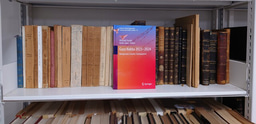“Fragile Stability” as a Political Background of October 7: Current and Foreseeable Issues in the Israeli-Palestinian Conflict
Published in Sustainability and Law, Politics & International Studies

Juno Kawakami, responsible editor for the book “Fragile Stability” as a Political Background of October 7: Current and Foreseeable Issues in the Israeli-Palestinian Conflict interviewed the volume editors, Aiko Nishikida, Chie Ezaki, Toshiya Tsujita, about topics related to their book.
What was the motivation for you to plan, edit and write this book?
Faced with the outbreak of the Gaza War on October 7, 2023—a moment widely regarded as a historical turning point — we were compelled, as researchers, to confront a profound challenge: to what extent do our existing analytical frameworks remain valid, and how should we interpret the significant shifts in the geopolitical landscape that diverge markedly from previous patterns? This sense of urgency motivated us to seek approaches capable of unraveling such complex issues. We came to recognize the necessity of conducting analyses grounded in international and interdisciplinary collaboration, as exemplified by this volume, which brings together scholars from diverse fields of expertise.
What do you mean by “fragile stability”?
This refers to the state of "fragile stability" that prevailed prior to the surprise attack by Hamas and other armed groups on October 7 and the subsequent outbreak of the Israel-Gaza war. Although the situation appeared calm on the surface, with no major hostilities, it was in fact marked by deep-seated structural issues across multiple dimensions. These underlying tensions rendered the equilibrium highly vulnerable, with the potential to collapse into large-scale conflict at any moment. We believe that such precarious balances are not unique to the Israeli-Palestinian context, but are also applicable to many other regions characterized by entrenched conflict dynamics.
How does your book differ from other books on the market about Palestine?
Rather than focusing solely on the actions and evaluations of one party to the conflict—such as the issue of Israeli occupation or armed attacks by the Palestinian side (often referred to as terrorism)—this perspective emphasizes the structural problems embedded within seemingly stable conflicts, as well as within the internal dynamics of the actors involved and broader regional and international trends. By applying interdisciplinary approaches from political science, anthropology, international law, and other fields, this framework seeks to identify latent sources of instability. We believe this approach offers a novel perspective through which to analyze conflict situations.
The book includes chapters by Japanese, Palestinian and Israeli authors. Were there any differences in opinions? Were there commonalities? How did you put together the people? Did you face any challenges?
The foundation of this volume was built upon the collaborative efforts of the three editors, who had long exchanged ideas in various research forums from previous years. The process of aligning the analytical frameworks and positioning each chapter within the overall structure of the book proved to be a significant challenge. However, the contributing authors shared a common background in the social sciences, which helped minimize major disagreements in perspective. Naturally, we requested revisions to some manuscripts to better fit the conceptual framework of the volume, but all authors responded with great cooperation.
The most difficult aspect of the editorial process was the race against time: writing and proofreading took place in parallel with rapidly unfolding developments. The situation was evolving daily—and at times, with remarkable speed—raising constant questions about how much of these changes we could realistically incorporate into the book.
You talk extensively about how Fatah and Hamas work and separately also about the internal dynamics within Israeli society and politics. When coverage about this is not so extensive in mainstream media, what is the value of analyzing these issues at length?
The central argument of this volume, framed within the concept of “Fragile Stability,” is that the events of October 7 did not emerge as a sudden anomaly. Therefore, it was essential for this book to provide a comprehensive understanding and explanation of the conditions leading up to October 7, particularly affecting roles of both Israeli and Palestinian actors. In this context, examining the inner politics of Fatah and Hamas, as well as developments within Israeli domestic politics, is of critical importance.
The word “resistance” is frequently misunderstood or mis-used. How does your book explain this term? And how does the resistance by Hamas, Iran, and the international community differ in meaning?
The Israeli-Palestinian conflict involves a wide array of actors, each driven by distinct values and interests. As a result, not only is it difficult to reach a consensus acceptable to all parties, but even the initial step of defining the core issues necessary for resolution—the process of "problem definition"—is itself highly complex. When different actors define the problem in divergent ways, the logic of "resistance" may emerge according to their own perception of the problem, which may differ from that of others. By clarifying what "resistance" means for each actor, we can gain deeper insight into the structural dimensions of the conflict, as well as the values and interests held by the diverse stakeholders involved.
You talk about what happened before Oct 7, 2023. Did you engage in field work yourself? How did you each become interested in issues related to Palestine/Israel?
Each of the editors and authors has conducted field research over many years in the region, and the paths that led us to this area of interest differ. Although the field may appear narrow from an academic standpoint, our approaches to fieldwork and conflict analysis vary, as do our networks with local researchers and practitioners. Nevertheless, we share a common understanding that the combination of these diverse approaches and networks can generate new insights, ideas, and questions. This shared recognition has been a source of strength throughout the development of this volume.
What kind of reactions did you receive from readers regarding your book?
Compared to previous episodes of conflict, the rapidly evolving situation posed a unique challenge. Nonetheless, it was encouraging to receive comments not only acknowledging the difficulty of analyzing such fluid developments at the time of writing and publication, but also recognizing the significance of attempting to do so from a range of disciplinary and analytical perspectives.
Who do you want your book to be read by?
The chapters that draw on specific disciplinary knowledge and approaches are intended for students and researchers with an interest or specialization in those respective fields. At the same time, as with conflicts in other regions, it is difficult to fully grasp the structural dimensions of conflict through the lens of a single discipline. This volume is also aimed at readers who wish to take an interdisciplinary and holistic perspective on the situation before and after the 2023 Israel-Gaza War. Furthermore, we hope that students and specialists interested in conflicts in other regions will find this book useful as a reference for analyzing situations of the ongoing confrontation and conflict.
What do you recommend for students or anybody who wish to learn more about Palestine and the Middle East?
In addition to deepening understanding the history of conflict, we hope readers will also engage with the history of coexistence, and through that process, deepen their thinking about the possibilities of both confrontation and dialogue. By valuing the insights they gain and challenging themselves to combine different perspectives, readers can experience the process of formulating new questions—an experience that often leads to fresh understanding and learning. Precisely because we live in what is often described as "an age of uncertainty" or "an era without clear answers," there is great significance and educational value in confronting the complex history and current realities of Palestine/Israel and the broader Middle East.
Do you have a message for other scholars throughout the world?
Even this unprecedented humanitarian crisis has been shaped by an underlying historical and political background. We believe it is the role of researchers to consider these factors and suggest proposals for solutions. We sincerely hope that this volume will serve as a useful resource in fostering such an understanding.


Please sign in or register for FREE
If you are a registered user on Research Communities by Springer Nature, please sign in